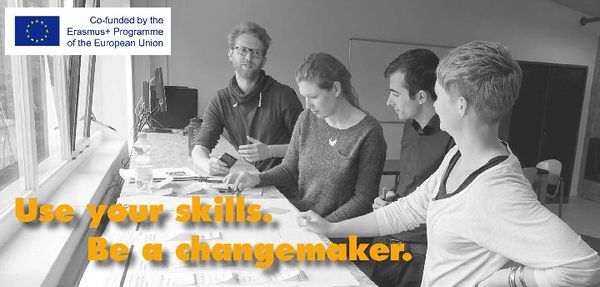Online Seminar: Community Innovation - From Idea to Implementation
An international online seminar offered by a European partnership of universities and NGOs
Course Duration: October 2019- January 2020
>>>Access seminar materials and recordings
For whom is this course?
- Are you a business or economics student who cares about social and environmental problems?
- Are you an agronomy student who wants to make agriculture more beneficial for society and the environment?
- Are you a planner, designer or artist who wants to learn how to start a business that helps solve social problems in your everyday environment?
- Or are you already a professional?
- Are you curious about other people and their knowledge and want to learn from other Europeans?
- Do you believe in your capability to create something new?
- In short, would you like to become a social entrepreneur? Then join us this semester, because everyone can become an entrepreneur!
Who is offering this course?
Community Learning for Local Change is a programme offered by a 4-University Consortium in cooperation with relevant NGOs. The goal is to empower future social entrepreneurs through an interdisciplinary, problem-based learning environment that enhances the innovative competencies needed for addressing social, cultural and environmental challenges in Europe. The programme is funded by the ERASMUS* Programme in the period 2018 - 2021.
Course Objectives
The goal of this course is to grow ideas in the field of social innovation. Ideally, you join this programme with your own innovation idea in mind. You may also participate as a team.
The course is designed as a follow-up of the online programme 'Social Entrepreneurship for Local Change' which has been running during the summer term.
However, participation in this previous course is not a prerequisite. Anyone with a concrete social innovation idea in mind can participate.
Social or community innovation ideas typically address one or several of the following sustainability challenges:
- Unfulfilled needs of vulnerable social groups
- Local environmental challenges such as unsustainable traffic, energy consumption, biodiversity decline, water pollution or other threats to public health
- Local social challenges such as lacking governance at community level, social disintegration and lack of services of general interest (culture, education, transport etc.)
- Local economic challenges such as disappearing food supply, retail and services at neighborhood level, lack of alternatives for sustainable consumption
Content Overview and Course Schedule
- Our online lectures will take place from 08.10.2019 – 14.01.2020, with one weekly session on Tuesdays from 16 00 – 17 30 pm CET.
- The weekly sessions have a duration of 90 minutes and are delivered online via our virtual classroom
- We will introduce the course topics during the weekly sessions with a mix of theory inputs, exercises, peer discussions and presentation of additional readings for self-study.
Preliminary Course Schedule and Topics
Phase A: Designing an Organisational Form
- A.1, 07.10.2019: Introduction to the seminar: From Idea to Implementation - What does it imply?
- A.2, 15.10.2019: Understanding the start-up phase: Methodologies for supporting start-ups.
- A.3, 22.10.2019: Ownership models and their legal environment
- A.4. 29.10.2019: Cooperation models
Phase B: Product and Service Design
- B.1, 05.11.2019: Introduction to product and service design
- B.2, 12.11.2019: How to conduct a market research
Phase C: Developing the Financial Plan
- C.1, 19.11.2019: Financing resources
- C.2, 26.11.2019: Cash flow and financial modeling
Phase D: Promotion and Selling Strategies
- D.1, 03.12.2019: Creative use of advertising and promotion
- D.2, 10.12.2019: Distribution Channels
Phase E: Management
- E.1, 17.12.2019: Staffing and Leading
- E.2, 07.01.2020: Quality Management and Impact Evaluation
- E.3, 14.01.2020: Risk Management
Assignment and Course Work
- During the seminar you are invited to work on your own social business or social innovation idea. The goal of this programme is to help you growing your ideas.
- The outcome will be an advanced business plan (or implementation plan), you can set your own emphasis with respect to your needs.
- Successful candidates will receive a seminar certificate (5 ECTS). However, students need to seek individually for academic recognition at their respective universities (if needed).
- There is usually at least one recognition opportunity at each university of our ERASMUS partnership
- The seminar requires approximately 2-3 additional hours of work per week (in addition to the seminar session of 90 minutes duration).
Online Registration
- Please register before October 8, 2019 in order to be able to follow the course process
- Seminar Online Registration
Further information
ERASMUS+ Programme and the German National Agency


